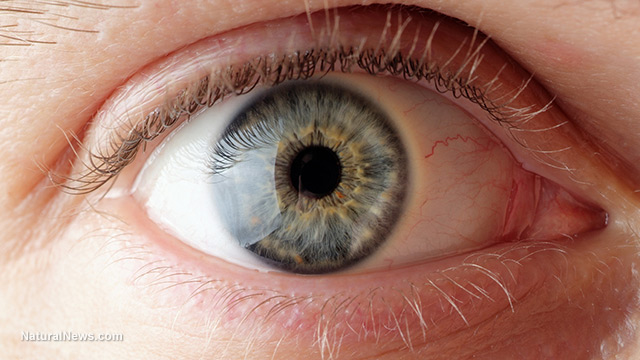Simple eye exam could successfully detect Alzheimer's disease years before symptoms arise, new research shows
Friday, July 15, 2016 by: J. D. Heyes
Tags: Alzheimer''s, eye test, amyloid plaque detection

(NaturalNews) A new eye test that is simple to perform could help primary care providers effectively diagnose Alzheimer's disease many years before signs and symptoms show up in patients. That means it may also be possible to conduct medication trials for treating or preventing the progression of the disease, according to new research.
As reported by United Press International, scientists at the University of Minnesota discovered differences in light pattern reflection off the retinas of mice that progressively changed as they developed Alzheimer's disease. That suggested to researchers that the ailment could be detected long before symptoms present themselves either to patients or to their doctors.
Upcoming: Attend the FREE online Alzheimer's and Dementia Summit by signing up now.
At present there is no reliable test for Alzheimer's disease. Currently it is diagnosed from a set of symptoms that present themselves and grow progressively worse over time.
And, while scientists still don't know exactly what causes the disease, research indicates that amyloid plaque buildup in the brain may be the culprit. Scientists have linked the buildup – which can be detected utilizing a special device – to steadily declining mental, memory and cognitive skills as the disease progresses.
Researchers at the Center for Drug Design at the University of Minnesota note that the retina and brain undergo similar changes as a result of Alzheimer's; they are both connected because they are part of the central nervous system. However, because the retina is readily accessible for examination, the changes there are much easier to detect, UPI reported.
"We saw changes in the retinas of Alzheimer's mice before the typical age at which neurological signs are observed," Dr. Swati More, an assistant professor at the Center for Drug Design, said in a press release. "The results are close to our best-case scenario for outcomes of this project."
In conducting the study, which was published in the journal Investigative Ophthalmology and Visual Science recently, researchers said they built a spectral imaging system that utilized a machine vision camera and tunable wavelength apparatus to measure light reflection off retinas of test mice.
Click now to attend the FREE online Alzheimer's and Dementia Summit!
When comparing the variances in how light was reflected in mice with Alzheimer's and age-matched wild-type mice that were disease-free between the age of 3 and 8 months, scientists discovered that mice with the disease had reductions in the amount of light that was bouncing off their retinas.
Changes in light reflection indicate a buildup of amyloid in the retina, and therefore, also in the brain. As such, using the technique developed by the University of Minnesota researchers, it is possible to detect the disease long before cognitive and memory declines are seen.
In the coming days, researchers are planning to begin phase 1 of clinical trials of their retina imaging system with humans. They say they hope eventually to develop an inexpensive diagnosis method that could then lead to effective, early treatment of the disease, instead of simply managing its symptoms.
To treat the disease, Dr. Robert Vince, director of the Center for Drug Design, said patients would have to begin therapy before there were signs of the disease. Until now, he added, the possibility of testing the efficacy of treatment regimens was not possible, because no diagnostic tool existed to measure treatment effects.
"Using currently available detection methods, you have to wait until the plaque is formed to identify Alzheimer's disease," Vince said in a press release. "This technology is a noninvasive way to identify Alzheimer's disease before plaque is formed."
No matter how the disease is diagnosed, other experts and medical professionals prefer natural treatments – and that is the subject of an upcoming Alzheimer's and Dementia Summit, featuring Sayer Ji. To find out more, sign up today.
Sources:
UPI.com
Twin-Cities.UMN.edu
ARVO.org
Alzheimer''s at FETCH.news
Get independent news alerts on natural cures, food lab tests, cannabis medicine, science, robotics, drones, privacy and more.
Take Action: Support Natural News by linking to this article from your website
Permalink to this article:
Embed article link: (copy HTML code below):
Reprinting this article:
Non-commercial use OK, cite NaturalNews.com with clickable link.
Follow Natural News on Facebook, Twitter, Google Plus, and Pinterest
- CLOT SHOT PLANDEMIC UNFOLDING: Fibrous, rubbery clots caused by covid injections have prion-like seeding activity
- Widespread social and economic unrest: Steve Quayle issues urgent financial warning of imminent asset collapse in new interview with Mike Adams
- DEATH by VACCINE or face PRISON time: Canadian Freedom Convoy leaders CONVICTED for protesting forced vaccination during the Covid Plandemic
- How to detox from metals falling out of the sky
- Aerosolized bioweapons? Strange “diploid biomasses” falling out of the sky in Florida captured under the microscope
- How the peanut allergy epidemic was fueled by faulty science and institutional arrogance
- How Israeli military-connected corporations are secretly controlling your online privacy
- “Rockefeller Medicine Men”: Today’s healthcare crisis stems from the creation of the American medical establishment
- Thimerosal is 50 percent MERCURY and NO it has NOT been removed from vaccines - that was a BIG FAT LIE the CDC told vax skeptics to keep them vaxxed up and dying
- Global financial Ponzi scheme collapses in real time as markets plummet, Mike Adams and Steve Quayle warn of impending chaos
- Kiss Your Genetic Privacy Good-Bye! 23andMe Gets Green Light to Sell Your Intimate Genetic Details to Anyone They Want
- Mike Adams releases country western hit single: Goin’ Back in Time is Comin’ Home
- Analysis: The coming economic collapse, a mass uprising and Trump's three secret weapons to halt the growing revolt
- EU takes aim at Elon Musk's X with potential $1 billion fine under Digital Services Act
- The hidden war above: Chemtrails, HAARP and the battle for planetary control
- Washington State expands hate crime bill but ignores left-wing violence against Tesla owners
- Defunding DEADLY mRNA jabs: Government funding for mRNA technology being scrutinized and sidelined until proven "safe and effective" for real
- Rep. Jamie Raskin demands that 17 deported Tren de Aragua and MS-13 gang members be returned to the U.S. from El Salvador
- Aerosolized bioweapons? Strange “diploid biomasses” falling out of the sky in Florida captured under the microscope
- European Court of Justice: Healthcare professionals who promoted or administered COVID-19 vaccines are CRIMINALLY LIABLE for any harm caused
- Newly released JFK files reveal Pentagon's role in creating Lyme disease and covid in the same lab
- Analysis: The coming economic collapse, a mass uprising and Trump's three secret weapons to halt the growing revolt
- FBI imposed gag order on agents to silence Hunter Biden laptop truth before 2020 election, new chat logs reveal
- Britain’s descent into police state censorship: Parents raided for questioning their daughter’s school system online
- “Project Aldrin”: Senate probes Meta's alleged censorship dealings with China
- Kiss Your Genetic Privacy Good-Bye! 23andMe Gets Green Light to Sell Your Intimate Genetic Details to Anyone They Want
- Oncologist warns of ‘terrifyingly aggressive’ cancers in children, linked to immune suppression from COVID vaccines
- Mike Adams releases country western hit single: Goin’ Back in Time is Comin’ Home
- Utah governor allows ban on LGBT pride flags in public buildings and schools, will take effect without his signature
- AI-powered forecasting model proves more accurate than traditional systems at predicting the weather
- When antibiotics are unavailable, natural ANTIMICROBIAL compounds become essential first line defenses against infection
- German researchers find link between mRNA vaccines and GENETIC CHANGES that precede CANCER and AUTOIMMUNE DISORDERS
- Defunding DEADLY mRNA jabs: Government funding for mRNA technology being scrutinized and sidelined until proven "safe and effective" for real
- The Health Ranger releases “Vaccine Zombie” song and music video, using AI-animated zombies for the music video
- Dr. Mary Talley Bowden drops bombshells about children being permanently damaged by mRNA jabs during Tucker Carlson interview
- The hidden war above: Chemtrails, HAARP and the battle for planetary control
- Newly released JFK files reveal Pentagon's role in creating Lyme disease and covid in the same lab
- California's social media censorship law struck down: A victory for free speech or a threat to online safety?
- The Health Ranger releases “Vaccine Zombie” song and music video, using AI-animated zombies for the music video
- Dr. Mike Yeadon releases 15-minute testimony - WATCH - about genocidal intent of COVID “vaccines”
- EPA advisor admits the agency is funneling billions to climate groups ahead of Trump’s return to White House
- Rep. Nancy Mace introduces bill to ban biological males from female facilities on federal property
- Mike Adams releases country western hit single: Goin’ Back in Time is Comin’ Home
- Florida takes a stand: DeSantis proposes permanent ban on mRNA vaccine mandates
- Sugarcane extract superior to cholesterol-lowering drugs?
- Survival 101: Effective EMF blocking techniques
- OpenAI whistleblower who dissented against how the company trained ChatGPT found dead
- CONSERVATIVES SOUND THE ALARM: Big Pharma and the Left trying to force $32 billion money grab from America’s seniors into year-end spending deal
- Pilots report mysterious lights 'moving at extreme speeds' across Oregon skies
- Attorney and TikTok influencer explains how he was offered hundreds of dollars to make false claims about Trump, Republicans
- Trump reverses course on Gaza plan, says “nobody is expelling Palestinians”
- Trump expected to choose Kelly Loeffler as his agriculture secretary even though she was caught INSIDER TRADING during COVID
- MEDICAL BOMBSHELL: FDA admits Covid mRNA 'Vaccines' CAUSE CANCER
- Marketing director responsible for WOKE Jaguar rebrand is also an LGBT activist who supports Black Lives Matter
- Red Cross issues warning to stop blood plasma donations from vaccinated people
- Scientists confirm: GENIUS brain function can be spontaneously unleashed in humans without any apparent cause
- EPA advisor admits the agency is funneling billions to climate groups ahead of Trump’s return to White House
- HYSSOP: What research reveals about the health benefits of this ancient holy herb
- Two containers with completed ballots fall out of truck in Florida
- Fully vaccinated about to see “tsunami” of illness and death, warns virologist
- Global leaders unite to clamp down on “misinformation” with UN-backed Cascais Declaration
- Newly released JFK files reveal Pentagon's role in creating Lyme disease and covid in the same lab
- BREAKING: 2025 NDAA authorizes mandatory military draft of WOMEN across America… as Pentagon pursues global NUCLEAR war with both Russia and China at the same time
- Michael Yon warns of a ZIONIST TAKEOVER in Trump’s second administration
- Ozempic and Wegovy weight loss drugs are injectable LIZARD VENOM PEPTIDES that may unleash a devastating wave of organ failure… side effects align with symptoms of SNAKE BITES
- BOMBSHELL: DNA testing kits are a SCAM to develop ethnic-specific bioweapons
- The Health Ranger releases “Vaccine Zombie” song and music video, using AI-animated zombies for the music video
- Israeli soldiers accused of even more torture and abuse in the West Bank
- These 13 countries just signed an agreement to engineer a global FAMINE by destroying food supply
- NASA admits that climate change occurs because of changes in Earth’s solar orbit, and NOT because of SUVs and fossil fuels
- RFK Jr. clears key hurdle: Sen. Susan Collins backs controversial HHS nominee, signaling a new era for health policy
- Sermon 30: How Jesus reveals Caesar’s FAKE CURRENCY and FALSE AUTHORITY
Science News & Studies
Medicine News and Information
Food News & Studies
Health News & Studies
Herbs News & Information
Pollution News & Studies
Cancer News & Studies
Climate News & Studies
Survival News & Information
Gear News & Information
News covering technology, stocks, hackers, and more



"Big Tech and mainstream media are constantly trying to silence the independent voices that dare to bring you the truth about toxic food ingredients, dangerous medications and the failed, fraudulent science of the profit-driven medical establishment.
Email is one of the best ways to make sure you stay informed, without the censorship of the tech giants (Google, Apple, Facebook, Twitter, YouTube, etc.). Stay informed and you'll even likely learn information that may help save your own life."
–The Health Ranger, Mike Adams












































